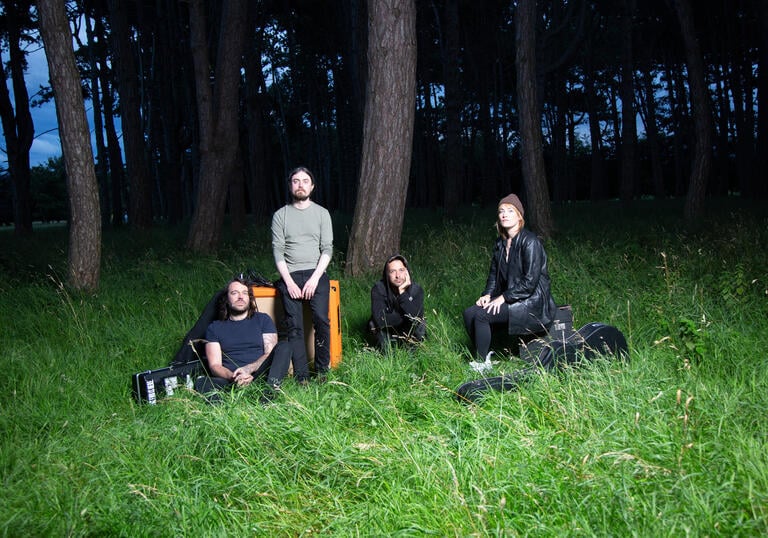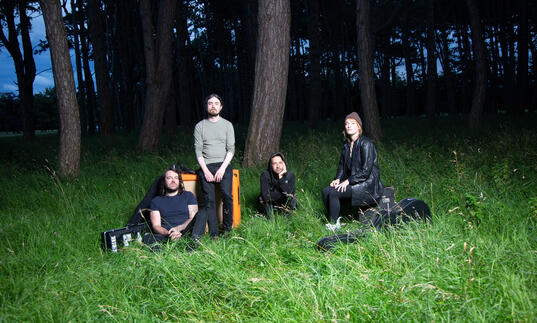Lankum - digital programme notes

Martin Aston sits down with the Irish group that have redefined a generation of folk music ahead of their hotly anticipated Hall debut.
Just over three years since Covid cancelled the original date, Lankum finally make their Barbican debut, bridging a short European run and a UK tour with a considerable wind in their sails. Following their 2019 album The Livelong Day, which won Ireland’s RTE Choice Music Prize, the Dublin quartet’s new album False Lankum expands their uniquely gripping trawl of traditional folk music and has just landed at number two in the Irish album charts and for the first time in the UK Top 50.
But to describe Lankum as a traditional folk band, ‘mis-represents us, because our music isn’t traditional,’ says Daragh Lynch, one fourth of Lankum alongside his brother Ian, Radie Peat and Cormac Mac Diarmada. ‘It’s more accurate to say that traditional folk is one element – a big element - but it’s only traditional in a social context.’
Across four albums, Lankum’s four multi-instrumentalists (and with Cormac fronting his first track on False Lankum, all four sing too) have wielded the colours of traditional folk roots, including uilleann pipes, concertina, tin whistle, fiddle, banjo, bayan and harmonium, but their slow, almost gothic temperament is closer to drone merchants Sunn O)))), or the art-rock mood board of artists that all four Lankum members enjoy, such as Richard Dawson, Brian Eno, Scott Walker, Gavin Bryars and Portishead.
Lankum’s own roots are in the folk-punk-minded Lynched, formed in the early Noughties by the Lynch brothers before they gravitated towards traditional folk, crossing paths on the Dublin pub circuit with Radie and Cormac. Bewitched by traditional folk music’s DIY and community spirit, and its commentary on social mores as well as love, morality, crime and punishment, the band are diligent researchers, as their detailed album sleevenotes confirm.
‘We dig in the archives, hear songs and read old manuscripts, or learn from older singers,’ says Daragh. ‘We want to know where the songs come from, and how they have changed.’
Take False Lankum’s opening epic ‘Go Dig My Grave’. The ballad is a member of a family of songs consisting of what are known as ‘floating verses’, originally composed as stanzas of various different ballads, in this case the likes of ‘Died For Love’, ‘The Butcher Boy’ and ‘The Brisk Young Farmer’. But all versions tell of a young woman who hangs herself because of a broken heart. Learnt from the singing of Jean Ritchie from the 1963 album Jean Ritchie And Doc Watson At Folk City, it begins with Peat’s forlorn voice alone, gradually adding the other members’ voices and instruments that approximate a funeral procession, inspired by the Irish tradition of keening (from the Irish caoineadh), a traditional form of lament for the deceased regarded by some as opening up, ‘perilous channels of communication with the dead,’ and severely censured by Ireland’s Catholic church since the 17th century.
Another example is ‘The Black Seam’, a mining industry lament written by Sting but learnt via ‘80s folksingers Swan Arcade, which Lankum are rehearsing for the Barbican show. And then there is ‘False Lankum’ itself, also known under at least 15 other titles, including ‘Bold Lamkin’, ‘Bolakins’, ‘Cruel Lincoln’ and ‘False Lanky’. The band have never covered the song but adopted the name Lankum in 2016 after deciding they could no longer be known as Lynched, ‘while the systemic persecution and murder of black people in the USA continues,’ they explained.
False Lankum, however, became the band’s new album title, ‘because we became obsessed with the idea of doppelgängers, of good and bad, true and false,’ Daragh explains. ‘Maybe the true Lankum is out there, and maybe we’re here to destroy everything! It’s also about opposing dark and light, which fits in with the album.’
After they self-released Cold Old Fire in 2014, Lankum’s first two albums after signing to Rough Trade Records (Between The Earth And Sky in 2017, The Livelong Day in 2019) had a very black seam indeed. But for False Lankum, ‘We decided to keep pushing further what we’d already done,’ says Daragh. ‘To make the dark darker, even horror-inducing, and then lighter parts that are almost sweet’. Hence the contrast of the tender (but tragic) child ballad (and murder ballad) ‘Lord Abore And Mary Flynn’ and the dreamy ‘Netta Perseus’ (one of two originals on the album written by Daragh) with ‘Go Dig My Grave’ or ‘The New York Trader’.
‘The New York Trader’ and ‘Clear Away In The Morning’ are sea-faring songs on False Lankum, which reflect the album’s genesis during Ireland’s first lockdown; concerts cancelled; a tower outside Dublin, ‘one of several squat buildings dotted along the coast, which in past times had fires on the top to alert other stations, and cannons that spun 360 degrees,’ says Daragh. There might even be a silver lining to Lankum’s belated Barbican appearance; without the distraction of touring, False Lankum has become their finest, most focussed album yet and its expansive qualities will benefit from the concert-hall setting. It promises to be a special night; a piece of Lankum’s own folk history in the making.
Details
Performers
Ian Lynch – vocals, uilleann pipes, concertina, tin whistle
Daragh Lynch – vocals, guitar, percussion
Radie Peat – vocals, bayan, concertina, harmonium
Cormac Mac Diarmada – vocals, fiddle, viola
Live event

+ Tara Clerkin Trio
